******* THE DRAGON FRUIT (OR PITAYA) ******
************ (OR PITAHAYA) ************
***** IS ALSO PRODUCED ON THE REUNION ISLAND *****
PAGE 3/3
Photos of the various plants and fruits
Here are some photos about the various growing supports, plants and fruits (Hylocereus undatus, Hylocereus costaricensis and CIRAD's hybrid Hylocereus).
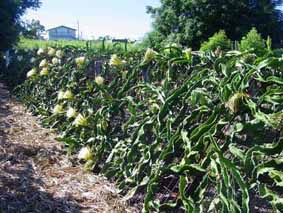
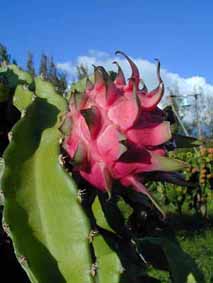
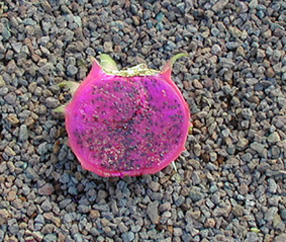
Growing on stakes, whole fruit, then Hylocereus costaricensis cut view fruit
______________________________________
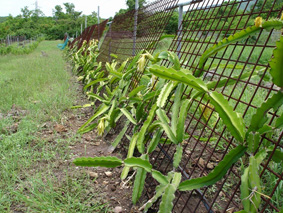
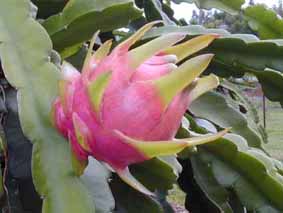
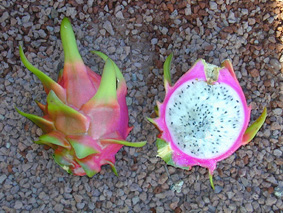
Growing on tilted netting of Hylocereus undatus, whole fruit then cut view fruit
___________________________
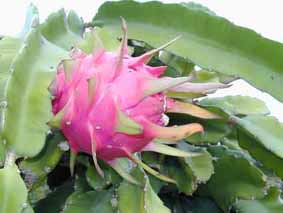
CIRAD's hybrid Fruit (interior with red pulp)
_______________________________________
Note about two more fruits
This fruit, called yellow Pitaya, is the fruit of Selenicereus megalanthus. For a few years it's been much more difficult to find on the European market. It is produced only in Colombia and its selling price is higher than the price of Hylocereus fruits. It's also smaller and the waiting time between blooming and fruit harvest is 2,5 times longer than for Hylocereus fruits . It's a pity because its flavour is, apparently excellent.
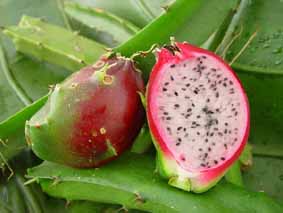
This photo shows a fruit of Hylocereus trigonus, originating from the West Indies ; it's a species that is said to be endangered. In Guadeloupe, the CIRAD is carrying out a similar strategy to the one which was described in this article for Pitaya in the Reunion Island.
BACK TO THE BEGINNING OF THE ARTICLE ABOUT PITAYA ON REUNION ISLAND (PAGE 2/3)
BACK TO THE PAGE 1/3 ABOUT THE DRAGON FRUIT
________________________________________________________________________
Bibliographical sources
To write this article, I used several articles written by Fabrice Le Bellec, who sent them to me. You can consult these articles (at least a summary) by using the following links which were indicated to me by the author. You can contact the author using the following links :
http://www.edpsciences.org/articles/fruits/abs/2006/04/i6020/i6020.html
http://www.edpsciences.org/articles/fruits/abs/2004/06/i4038/i4038.html
http://www.edpsciences.org/articles/fruits/abs/2002/04/Lebellec/Lebellec.html
You can also go to Fabrice Bellec's website, which treats of tropical fruits.
_________________________________________________________________________________